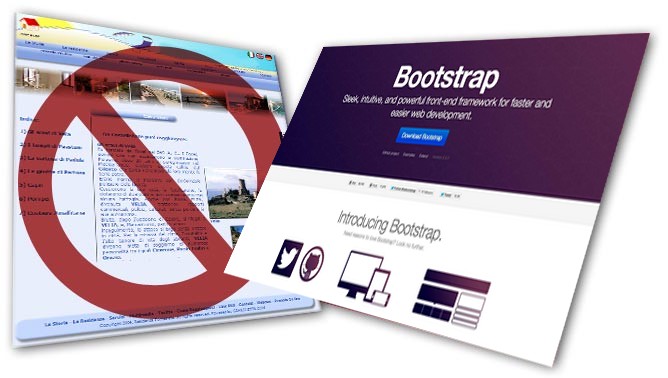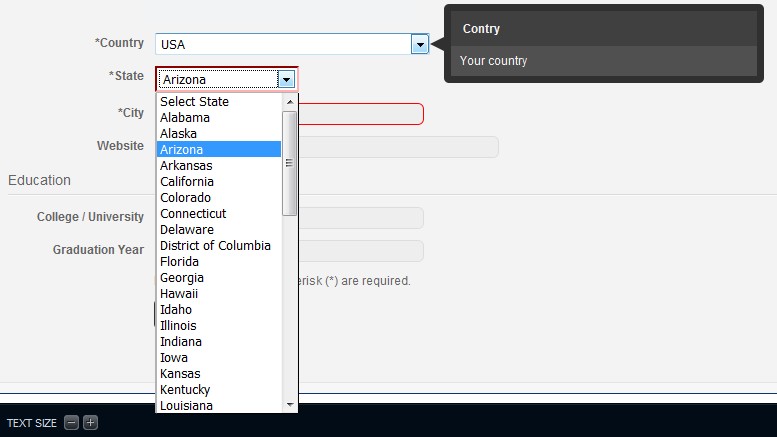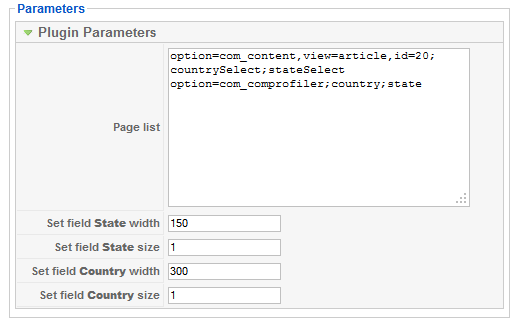Super User
Graphic Design
Our skilled team of graphic designers can provide professional products at a very affordable price. Our solutions include:
- Web Design
- Branding, Identity & Logo Design
- 3D Graphic and Rendering
- Animated Banners
- Flyers and Catalogs
- Multimedia Productions
- Special Effects and Photo Manipulation
This email address is being protected from spambots. You need JavaScript enabled to view it. or compile a request form to get a quote for FREE, or access to Client Manager and create a new project request.

CSLookup
CSLookup is a native Joomla plugin created for dynamically add a couple of drop down select list fields on any page and form for Country/State lookup. The Country list is automatically populated on page load, and when a user selects a Country from the dropdown list, the corresponding State dropdown list field will be automatically populated with the Country specific States. This can be used, as example, with JomSocial or Community Builder to add the Country/State lookup feature to the user profile form.

Usage is really simple! Just install the plugin from the Joomla! backend, enable it, and set the pages where you want to replace the Country and/or the State fields. The plugin can work on any form, it's sufficient that Country and State fields are "select" or "input" type (the select field can be initially empty), and have the HTML "id" attribute set. And this is not all!. If these fields have an initial value set, this value is automatically selected in the list created.

In the plugin settings there's a Page list text area, were each row can specify a page were replace the lookup fields. Each row MUST have the format parameters;countryid;stateid, where the parameters list MUST be in the format param1=value1,param2=value2,... (so a row example is option=com_community, view=register, task=registerProfile; field11; field9). If all parameters match, the lookup fields are created on the corresponding page, assuming that the select or input field with id "countryid" is the Country list, and the select or input field with id "stateid" is the State list. The plugin also support only the Country list, if the "stateid" is not specified.
Here is an example of how it works. In the form below, the Country and State fields are initially created with only one selected option using the following HTML code:
<form>
<table border="0">
<tbody>
<tr>
<td><select id="countrySelect" name="country"><option value="USA" selected="selected">USA</option></select></td>
<td><select id="stateSelect" name="state"><option value="Colorado" selected="selected">Colorado</option></select></td>
</tr>
</tbody>
</table>
</form>
And the plugin is configured to replace them on this page. Note that the initial values "USA" and "Colorado" are automatically selected.
CSLookup is released under GPL 2.0 license, and is available for download here.
Tag Meta
Tag Meta is a native extension (component + plugin) available for Joomla that allows to efficiently manage all site's meta information. With Tag Meta, as example, it is possible to set the tag 'title' or the meta tags (e.g. from the most common 'description', 'keywords', 'author', 'robots', as well as the recently 'content rights' and 'external reference') or link 'canonical' on any page, just specifying the URL or a part of it. This provides a swiss army knife to improve site positioning in SEO optimization. But Tag Meta also supports regular expressions in the matching rules and this allows to match a group of URLs with a single rule. In this way it is possible to manage all metadata from a single control panel.
Multiple rules can be applied together, so if more than a single rule matches with the current URL, these are applied in cascade using the ordering set, except if a rule is declared as ‘last one’ (in this case the process stop).
And that’s not all. Tag Meta comes with support for macros. This means that meta information can be generated dynamically for each page (e.g. there's a fantastic 'autokeywords' and ‘autokeywords2’ macro - Enterprise version only - that allow to extract automatically the most relevant words from a page content).
To allow complex transformations for data to use as meta info there are the placeholders. Placeholders allow you to define a set of values where each value is associated and identified by a name and is used in the definition of other placeholders or in the definition of meta info (practically they are based on the same principle of the variables in programming languages).
The plugin, finally, has some useful options to set custom global information like Generator, Author, Copyright, or to set and align the tag ‘title’ and the meta tag ‘title’ in many ways.
There are two versions of Tag Meta, Community and Enterprise, both released under GPL license. The Community version is completely free, while the Enterprise version has a little subscription fee, but introduces some advanced features. Here's a comparison matrix between Community version and Enterprise version:
| Features | Tag Meta Community | Tag Meta Enterprise |
|---|---|---|
| Support for tag 'title' and meta tag 'description', 'author', 'keywords', 'robots', 'content rights', and 'external reference' on each page |  |
 |
| Support for Robots options Index, Follow, Snippet, Archive, Odp, and Image Index |  |
 |
| Support for link 'canonical' |  |
 |
| Support for global meta tag 'generator' |  |
 |
| Possibility to add site name to tag 'title' |  |
 |
| Possibility to align meta tag 'title' with tag 'title' |  |
 |
| Possibility to preserve tag 'title' on each rule from global settings |  |
 |
| Support for global meta tag 'author' |  |
 |
| Support for global meta tag 'copyright' |  |
 |
| Possibility to add a note for each item |  |
 |
| Possibility to apply multiple matching rules |  |
 |
| Use of regular expressions into matching rules |  |
 |
| Case-sensitive option on the matching source URLs |  |
 |
| Request only option to match the full URL or just the REQUEST_URI part |  |
 |
| Decode URL option to decode URLs before to check if match with rule |  |
 |
| Last rule option to break application of matching rule |  |
 |
| Support for placeholders |  |
 |
| Use of macros to specify meta info (dynamic meta info) |  (46 macros) |
 (62 macros) |
| Macro {querydrop} to remove specified variables from the original query |  |
 |
| Macro {querydropfull} to remove specified variables from the original full query |  |
 |
| Macro {pathfrombaseltrim} to cut on left the path without the base part |  |
 |
| Macro {pathfrombasertrim} to cut on right the path without the base part |  |
 |
| Macro {preg_match} for apply regular expressions to full URL |  |
 |
| Macro {preg_select} for apply regular expressions to full URL and use result to query database |  |
 |
| Macro {autokeywords M,N} for automatic generation of keywords |  |
 |
| Macro {autokeywords2 M,N} for automatic generation of two-words keywords |  |
 |
| Macro {autosentence M,N} for automatic generation of sentences |  |
 |
| Macro {synonyms} for automatic generation of synonyms based on the ontology database |  |
 |
| Macro {nodevalue attrname,attrvalue} for extraction of any content from the document DOM |  |
 |
| Ontology database for synonyms with automatic generation of new synonyms from existing keywords |  |
 |
| Trace items usage with hits counter and info about last visit |  |
 |
| Trace synonyms usage with hits counter and info about last visit |  |
 |
| Configurable list of keywords to exclude from auto keywords generation |  |
 |
| Possibility to remove duplicated entries from keywords |  |
 |
| Possibility to remove the 'canonical' link if the page corresponds to the link itself |  |
 |
| Possibility to remove duplicated entries of 'canonical' link |  |
 |
| Possibility to set to a global base path for web site |  |
 |
| Safe UTF-8 word count function, for old PCRE versions without UTF-8 support |  |
 |
| REDIRECT mode, to support URL rewrite (e.g. sh404SEF) with Apache and IIS |  |
 |
| License | GPL 2.0 | GPL 2.0 |
| Price | Free | 9 € |
 |
 |
ReDJ
ReDJ is a native extension (component + plugin) available for Joomla that allow to manage URL redirections. This is very useful for creating URL aliases, and managing redirections from an old URL to a new one. A very similar extension has been added into Joomla since 1.6 version (Redirect component), but ReDJ supports powerful regular expressions that allow to match more than one source URL. In this way it is possible to create a group of redirections with just one ReDJ item. It's so easy.
Also, now ReDJ comes with support for macros into destination URL. This means that from now the destination URL can be dynamic.
Finally, an "internal redirect" feature has been added (Enterprise version only). With these features now is possible to create "real" URL alias with Joomla.
There are two versions of ReDJ, Community and Enterprise, both released under GPL license. The Community version is completely free, while the Enterprise version has a little subscription fee, but introduces some advanced features. Here's a comparison matrix between Community version and Enterprise version:
| Features | ReDJ Community | ReDJ Enterprise |
|---|---|---|
| Intercept and redirect any error 404 URL |  |
 |
| Support for 301 (Moved Permanently) |  |
 |
| Support for 307 (Temporary Redirect) |  |
 |
| Support for 200 (Internal Redirect) |  |
 |
| Use of regular expressions to specify matching source URLs |  |
 |
| Case-sensitive option on the matching source URLs |  |
 |
| Request only option to match the full URL or just the REQUEST_URI part |  |
 |
| Decode URL option to decode URLs before to check if match with rule |  |
 |
| Support for skip rule condition |  |
 |
| Support for skip usergroup condition |  |
 |
| Support for placeholders |  |
 |
| Option to apply a rule only in case of error |  |
 |
| Possibility to add a note for each item |  |
 |
| Use of macros to specify destination URL (dynamic destination URLs) |  (42 macros) |
 (54 macros) |
| Custom error page |  |
 |
| Use of macros to customize error page |  (6 macros) |
 (6 macros) |
| Trace redirections with hits counter and info about last visit |  |
 |
| Trace custom error page with hits counter and info about last visit |  |
 |
| Trace errors with hits counter and info about last referer and time |  |
 |
| Trace referers for each visited URL with hits counter and info about last visit |  |
 |
| Configurable list of referers to exclude from trace with macro support |  (2 macros) |
 (2 macros) |
| Option to redirect any error 404 URL to a custom page |  |
 |
| Option to shortcut extensions directly on the error page |  |
 |
| Option to set a global base path (easy items portability) |  |
 |
| License | GPL 2.0 | GPL 2.0 |
| Price | Free | 9 € |
 |
 |
